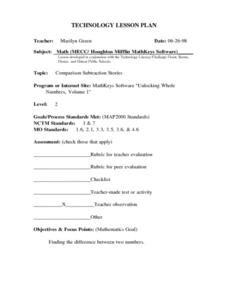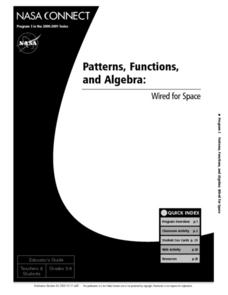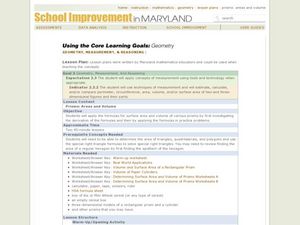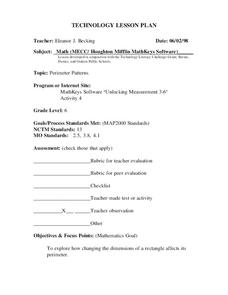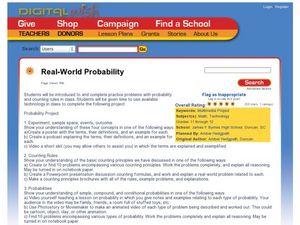Curated OER
Creating a Graph
Learners brainstorm favorite things to do during the summer. They survey classmates to collect data, arrange it in a chart, and create graphs using ClarisWorks.
Curated OER
Comparison Subtraction Stories
Second graders create stories that model comparison subtraction while using the environmental mats. They suggest situations in which they compare numbers. For example, if one student has 6 nickels and another child has 14 nickels,...
Curated OER
Traveling Through the Solar System
Students use calculator and non-calculator methods for analyzing data. They apply data collection and analysis in a study of mass and weight. Students enhance and apply the concept of line of best fit. They master graphing in a plane,...
Curated OER
Patterns, Functions, and Algebra: Wired for Space
Learners assess how patterns, functions and algebra can assist NASA engineers design new ways of propelling spacecrafts. They explore how electricity and magnetism are replacing the fuel-consuming rocket propulsion. Electromagnetism is...
Curated OER
Introduction to Measures of Central Tendency and Variability
Students calculate the mean, median, mode, range, and interquartile range for a set of data. They create a box and whisker plot using paper, pencil and technology.
Curated OER
Geometry, Measurement & Reasoning
Students measure prisms and determine their volume. In this measurement and reasoning lesson, students estimate the volume and area of prisms. They measure given boxes. Students use paper to create prisms and cylinders. They determine...
Curated OER
How many isosceles triangles can you find?
Seventh graders recognize the characteristics of isosceles triangles. In this isosceles triangle lesson, 7th graders use geoboards to create isosceles triangles. Students record results and explain why they have an isosceles triangle.
Curated OER
Creating a Simple Telegraph Machine
Students experiment and discuss circuits and how they work. In this science lesson, students construct a telegraph machine using cardboard, wires, battery, electric tape and masking tape. They investigate what happens as the circuits...
Curated OER
Areas of Trapezoids, Rhombuses and Kites
Students calculate the area of different polygons. In this geometry lesson, students find the area for trapezoids, rhombuses and kites.
Curated OER
Coin Count & Classification
Students make a prediction about how 100 pennies sort by decade or year and then test their predictions. They organize their data using a graph that is imbedded in this lesson.
Curated OER
Design a Recycling Game!
Students discover that recycling is using a product more than once so that natural resources can be saved and so that we won't need so many garbage dumps and landfills. They see that there are different ways to recycle. Students design a...
Curated OER
Design a Parachute
Students engage in a discussion about what a parachute is and how it works. They create a parachute using different materials that they think will work best. The students test their designs, which will be followed by a class discussion...
Curated OER
Perimeter Patterns
Sixth graders calculate perimeter of rectangles with different dimensions. In this perimeter lesson, 6th graders define length, width and perimeter. Students complete a perimeter activity using a web tool to change the...
Curated OER
Taking Estimation and Measurement Outside
Eighth graders gain a better understanding of visual distances and estimation. They actively practice using metric measurement and conversion. Students practice cooperative exploring and team building.
Texas Instruments
Construction Regular Polygons
Learners investigate the process necessary to construct regular polygons. They explore the degree measures of the angles in a regular polygon. Using this information and technology in the form of Cabri Jr., your pupils will construct...
Curated OER
Triangle Inequality Theorem
High schoolers investigate the relationship between angle measures and sides of a triangle and the relationships among the three sides of a triangle. The use of technology (Cabri, Jr.) allows learners to make and test conjectures as they...
Curated OER
Rectangles and Trapezoids in the Coordinate Plane
Students determine the missing vertices of quadrilaterals. In this rectangles and trapezoids lesson, students examine the characteristics of quadrilaterals. They identify the missing vertices of a quadrilateral on a coordinate plane.
Curated OER
Real-World Probability
Students explore the concept of probability. In this probability lesson, students create a video, poster, or podcast explaining what experiments, sample space, events, and outcomes are in relation to probability. Students...
Curated OER
Exploring Characteristics Needed to Prove Two Trianlges Congruent
Tenth graders explore congruent triangles. In this geometry instructional activity, 10th graders investigate the conditions necessary to prove two triangles congruent. The instructional activity combines dry erase board...
Curated OER
Catapults
Young scholars test catapults. In this physics lesson, student conduct scientific investigations that require them to test catapults. Students practice their problem solving skills as they employ the use of the scientific method.
Curated OER
Teddy Bears Everywhere
Students explore the history of teddy bears. In this comprehension lesson, students bring a bear of their own to compare and contrast with their classmates. Students read book and discuss the events and draw pictures of the scenes.
Curated OER
Wampum
Learners explore different ways of trading to get what they want. In this algebra instructional activity, students explore goods, money, services and exchange. They compare the use of money to the use of potlach.
Curated OER
Is the Slope Legal?
Students define parallel and perpendicular lines. In this algebra instructional activity, students relate the concept of parallel and perpendicular lines to the real world. They classify the lines based on their slopes.
Curated OER
Human Fingerprints: No Two the Same
Sixth graders explore scientific observations by analyzing a group of data. In this fingerprint identification lesson, 6th graders identify the reasoning behind fingerprinting and create their own ink fingerprints. Students discuss the...



